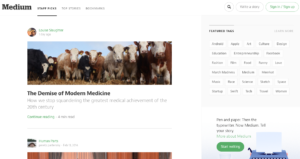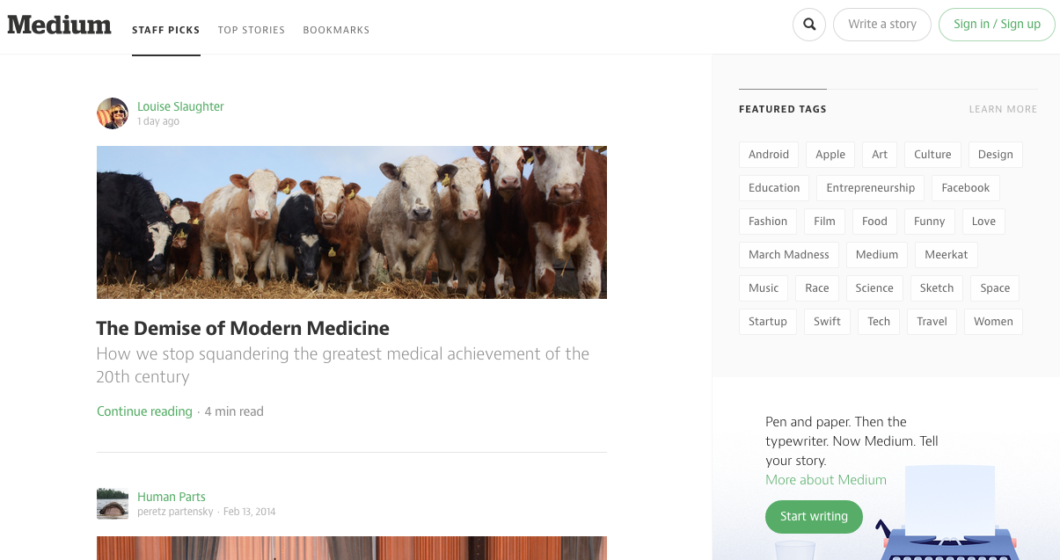Medium is very popular in the tech startup circles as being a new minimalistic blogging platform. It was founded by Twitter co-founders Evan Williams and Biz Stone in August 2012 as a way to share manifestoes, stories, and ideas.
 Every few years, it seems like a new blogging platform comes out and gets people raving. Remember Squidoo and LiveJournal? Of courses there’s also WordPress.com and Blogger. I wonder what the new flavor of the month be in the next few years.
Every few years, it seems like a new blogging platform comes out and gets people raving. Remember Squidoo and LiveJournal? Of courses there’s also WordPress.com and Blogger. I wonder what the new flavor of the month be in the next few years.
All sarcasm aside, I do think there are a few very valid reasons to use Medium as an inbound marketing platform. The community and curation aspects mean that your posts can reach a particular audience, in the same way that sharing something on Pinterest reaches a different audience than sharing something on Tumblr.
However, I would never seriously consider it as a primary blogging platform. The reasons are far too compelling to host your own writing on your own website. In fact, I’ve put together a few key points to consider before investing so much time and energy into creating content for this platform, particularly if it is your primary publishing outlet. Let me know what you think, particularly if you disagree!
1. If you like the aesthetics, you can duplicate that.
This post isn’t meant to hate on Medium. They’ve done a great job creating a minimalistic blogging platform. However, a lot of the people that I talk with rave about the design and why it was the main reason for hosting almost all of their writing on the platform. To me, that’s ridiculous.
If you spend a few minutes googling around the web, it doesn’t take an expert to find many minimalistic WordPress themes out there. There are 18k+ premium themes alone in the Themeforest marketplace.
Believe me, you’re going to be kicking yourself later down the road if one of your articles ends up getting massive search engine or social media traffic and rather than having the chance to connect with a bunch of new readers through email opt-ins, Medium and their email list receives most of the benefits instead.
Aside from building an audience, blogging is a great way to build up a website’s domain authority and to, over time, capture organic traffic from search engines. If your articles are hosted on another person’s domain name, then they will receive these hard-earned benefits rather than you.
Let’s google the terms “Facebook mobile login.” The search engine results below come up. On the first or second page (depending on your previous searches, etc), there is a medium article on “The right way to implement Facebook login for your app.”
According to SEMRush, this keyword has a volume of 165,000 searches and according to the google keyword planner, it’s 200,000 monthly searches.
Now, obviously I cannot speak on behalf of the person who wrote the article, but I know that I certainly would love to receive this kind of traffic to my own website and not send it to someone else’s while also hoping that that traffic will convert with click-throughs to my own website or social media profile. It’s kind of a no-brainer.
Over time, if you want to rank as an authority in a particular niche, I don’t see why you would want to make it harder for yourself by publishing articles on a platform you don’t own.
3. It’s more difficult to build an email list or promote products.
Yes, you can link to external websites on Medium, but naturally you’re going to have the most amount of information about your visitors on your on blog. On your own blog, you can determine that altering the style will affect conversions by X% or that such and such a product is doing better on one page, but not another.
Although Medium is a great out of the box blogging tool, you can’t install new plugins to expand on the functionality or customize the backend functionality further down the road. It doesn’t seem like this matters now (and believe me, I didn’t care about this also at one point), but it matters a lot down the road. Laziness with regards to learning how to work WordPress and customize your own blog will bite you in the behind later down the road.
4. It’s for the casual blogger with a small audience – but is it really?
I think there’s a lot of people that would argue that Medium is more geared towards the casual blogger or who wants his or her story to reach more people. While I do think that’s valid, I also think it’s ridiculous to set yourself up for competition when you’re going to be competing enough as a blogger.
At the end of the day, Medium is in the business of delivering its readers what they want to read, whether that is your content or not. You’re going to be competing with other writers for those spots and really, the platform functions as a content farm of sorts. If you’re writing a single manifesto, the argument makes sense, but a lot of the bloggers I know that consider themselves to be casual and publish semi-regularly also want to be pro deep down in their hearts. If this is the case, I wouldn’t make Medium your primary publishing outlet, but a secondary one.
So, should you blog on Medium?
There are a lot of notable celebrities in the social media marketing world that do blog on Medium like Gary Vaynerchuk. Don’t think that I’m bashing the platform. I just want newer bloggers to reconsider their decision to house the majority of their content on the website.
Ultimately, I think Medium is a great inbound marketing platform in the same way that you might submit a guest post to a person’s blog in your industry. Guest blogging and publishing on 3rd party platforms also makes a lot of sense if there is already a lot of content out there on a particular subject and you’re trying to stand out.
However, it would always be my goal to get that traffic, whether it’s from Facebook, Twitter, or Medium on to my own site, rather than lingering around on theirs.
If you’d like to learn how to set up your own blog, check out my previous post here.


wow this is a great page! you should also check ou this video deff gets me going under stress!! https://www.youtube.com/watch?v=H8rHNVxCNKc